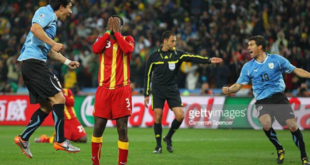While the protagonists for the year’s best player have remained largely the same since 2008, FIFA’s split from Ballon d’Or means Lionel Messi and Cristiano Ronaldo are competing for two separate gongs.
Ronaldo and Messi have dominated the award over the past eight years, with no other player winning the accolade as the world’s best since Kaka in 2007.
Ronaldo is hot favourite to scoop his fourth award having previously won it in 2008, 2013 and 2014 after winning both the Champions League with Real Madrid and Europ 2016 with Portugal.
But how has the most prestigious individual honour in world football evolved and does the new Best FIFA Men’s Player Award now hold greater weight?
Ahead of this year’s event on Monday in Paris, Sportsmail answers a Q&A on how the Ballon d’Or came about, when it joined and split from FIFA and all the details ahead of the upcoming ceremonies.
The Ballon d’Or was first won by Sir Stanley Matthews in 1956 when the then Blackpool winger pipped Real Madrid great Alfredo Di Stefano to the prize in a points system based on voting by football journalists.
Originally, only European players were in contention for the Ballon d’Or, but from 1995 all players at European clubs were made eligible.
The award was presented by France Football from its inception all the way through to 2009, but has been revived for this year.
Back in 2009, the Ballon d’or merged with the FIFA World Player of the Year award, and this time international journalists, national team coaches and captains were allowed to vote.
The FIFA World Player of the Year award had come into existence after Italia ’90, with West Germany stalwart Lothar Matthaus the first recipient in 1991 for helping his country to World Cup glory.
After 10 years of it being an award presented annually by the sport’s governing body to the world’s best male footballer, it was awarded to both sexes from 2001.
Brazilian Ronaldo and Zinedine Zidane both won the award on three separate occasions, with the former and Ronaldinho the only two players to have won it in successive seasons.
Since 2010, it has has been presented exclusively to the best female player, in the same year as the inaugural FIFA Ballon d’Or.
After the changes that enabled players from non-European clubs to win the Ballon d’Or, not everyone was content with the new arrangement, so in 2011 UEFA created the Best Player in Europe Award to be decided purely by journalists.
Replacing the UEFA Club Footballer of the Year, it ran alongside the FIFA Ballon d’Or from the 2010-11 season with Lionel Messi winning the inaugural award and Cristiano Ronaldo being acknowledged for last campaign.
But after FIFA and France Football broke the merging agreement in 2015, new FIFA president Gianni Infantino decided to revert to the old system, meaning the return of the Ballon d’Or.
Ronaldo is expected to challenge Barcelona rival Messi for the prestigious Ballon d’Or prize on Monday, with the Portuguese holding a strong set of cards.
The 31-year-old is hoping to add the FIFA Club World Cup to his glittering list of honours, but he will not be at the ceremony in the French capital owing to him having to jet off to Japan.
The iconic award, presented by France Football magazine, is given to the world’s best player as voted by 173 journalists from across the globe. Leicester City’s Jamie Vardy and Riyad Mahrez are two of eight Premier League players named on a 30-man shortlist.
30-MAN SHORTLIST FOR 2016 BALLON D’OR
Sergio Aguero (Manchester City), Pierre-Emerick Aubameyang (Borussia Dortmund), Gareth Bale (Real Madrid), Gianluigi Buffon (Juventus), Cristiano Ronaldo (Real Madrid), Kevin de Bruyne (Manchester City), Paulo Dybala(Juventus), Diego Godin (Atletico Madrid), Antoine Griezmann (Atletico Madrid), Gonzalo Higuain (Juventus), Zlatan Ibrahimovic (Manchester United), Andres Iniesta (Barcelona), Koke (Atletico Madrid), Toni Kroos (Real Madrid), Robert Lewandowski (Bayern Munich), Hugo Lloris (Tottenham Hotspur), Riyad Mahrez(Leicester City), Lionel Messi (Barcelona), Luka Modric (Real Madrid), Thomas Muller (Bayern Munich), Manuel Neuer (Bayern Munich), Neymar (Barcelona), Dimitri Payet (West Ham), Pepe (Real Madrid), Paul Pogba (Manchester United), Rui Patricio (Sporting Lisbon), Sergio Ramos (Real Madrid), Luis Suarez (Barcelona), Jamie Vardy (Leicester City), Arturo Vidal (Bayern Munich).
While France Football released a 30-man list for their award, a 23-man shortlist was also drawn up for the new Best FIFA Men’s Player 2016 award at the start of last month, which has since been whittled down to three.
FIFA ended its association with Ballon d’Or in September, meaning that Ronaldo and Messi will as of this year be competing for two separates gongs.
While solely journalists having voted for this year’s Ballon d’Or, the voting for the Best FIFA Men’s Player encompasses four separate groups.
It marks a change to the original format, with the general public now being allowed to cast their vote, alongside media representatives, national team coaches, and national team captains.
Each group has 25 per cent of the overall vote, with the public able to select from the shortlist via an online ballot and 200 media representatives selected to take part.
The Best FIFA Men’s Player for 2016 award was narrowed down to three players on December 2, with Messi and Ronaldo joined by Atletico Madrid forward Antoine Griezmann.
The winner will be crowned at the Best FIFA Football Awards ceremony on January 9 in Zurich, along with the Best Women’s Player and FIFA Puskas award (for the best goal of 2016).
 Pink 96.9 fm your life, your music
Pink 96.9 fm your life, your music





